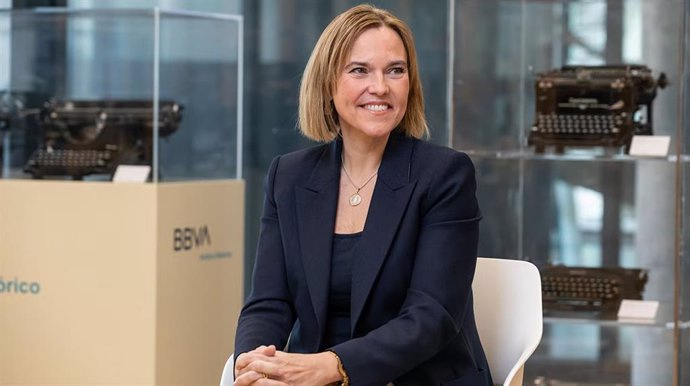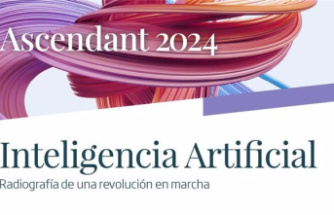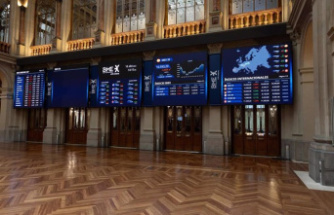MADRID, 11 Mar. (EUROPA PRESS) -
The financial director of BBVA, Luisa Gómez Bravo, has indicated that her entity is "firmly committed" to generating value for its shareholders and has indicated, as an example, the distribution of 13.2 billion euros between dividends and share buybacks between 2021 and 2023.
In an interview published today by the bank itself, Gómez Bravo has defended that the dividend charged to 2023, which in total is 0.55 euros per share, is "very high in historical perspective."
He went on to point out that the growth of the cash dividend has been particularly "significant" in the last five years: it was 0.26 euros per share in 2018 and has reached those 0.55 euros in 2023, "more than double."
"In that same period we have also more than doubled the recurring earnings per share (from 0.63 euros per share in 2018 to 1.32 euros in 2023), driven by share buyback programs, while the total payout has gone from 37% of profit in 2018 to 50% in 2023," he explained.
Gómez Bravo has also highlighted that BBVA has had a "better performance" than the average of its peers, since the total shareholder return (TSR) has been 57% in 2023, "more than double than that of the Stoxx Europe 600 Banks index of European banks and also more than double that of the average of competitors in Spain".
Asked about the share buybacks, Gómez Bravo pointed out that since the bank launched them, in November 2021, the number of shares has been reduced by 12%; With the new program, of 781 million euros, started last week, the reduction in shares will be around 14%.
"Buybacks make perfect sense if the stock is trading below what we consider its value should be. In the case of BBVA, which has a growing profit and differential profitability in Europe, we clearly think that the current price does not reflect the value that we think our action has," he defended.
In this sense, he highlighted that the average price of the three share buybacks that the bank has carried out to date has been 5.52 euros per share, while it is currently trading at around ten euros. Furthermore, he has argued that the progressive reduction in the number of shares translates into a dividend per share that increases "even more year after year."
On the other hand, regarding excess capital, Gómez Bravo has indicated that the entity's objective is organic growth through its strategic pillars: digitalization, innovation and sustainability. "BBVA's ability to combine profitability and growth is unique in the European banking sector and differentiates us from our competitors," he added.
He has insisted on this message by defending that the capital generation capacity is based on the bank's "solid business model", with a diversified retail bank and "leading" franchises that, together with "prudent" risk management , generate "recurring" results and "increasing" levels of profitability.
"We are one of the most profitable banks in Europe, with an ROE of 16.2% and a ROTE of 17%, with figures as of the end of December 2023," he noted.
For the future, BBVA will continue investing in profitable growth "under strict value creation criteria", while intending to maintain "attractive" remuneration for its shareholders. Thus, to the extent that excess capital continues to be generated, it will continue to be distributed with the objective of generating "incremental" value for shareholders, as it has been doing in recent years.
On the other hand, Gómez Bravo foresees that this year there will be a "progressive" return to a level of lower interest rates, especially in the US and Europe, which will entail a "certain narrowing" of customer spreads but . However, he believes that this "should be positive" in the future to achieve greater growth in activity and better credit quality metrics.
In this sense, he praised the "very good work" carried out by the financial management teams to cover and mitigate the impact on the financial margin in the different countries. "This is the clear case of Spain," he indicated.
In Mexico, Gómez Bravo foresees that BBVA will continue to have a dynamic activity and demand for credit, which will allow business growth in the country. "In addition, in all countries we have maintained and will maintain a proactive strategy of growth and share gain, especially in those most profitable portfolios. For all this, we are confident that 2024 will once again be a great year for BBVA," he concluded in this regard. .
Regarding her first months as financial director, a position she has held since last September, Gómez Bravo noted that it has been an "intense" period, but also "very exciting."
"I am lucky to have worked in the financial area before being head of corporate investment banking and now I return to an area where I know the teams well and they know me. This always makes landing easier. And also "It makes it easier that the group's momentum is so positive, not only because of the financial results but also because of the progress made in the execution of our strategy," he explained.
He has also pointed out that these first months have coincided with a series of "very relevant" processes for the organization in which the financial area is especially protagonist, such as the design of the budget, the results of the third and fourth quarter, capital planning and liquidity, the proposed remuneration to shareholders, etc.
Regarding the sustainable transition, BBVA's financial director points out that the objective of her area is to facilitate the effective execution of the bank's strategic priorities, including sustainability, ensuring an "efficient" allocation of resources, investments and capital towards the themselves.
"The business opportunity here is very relevant and requires us to make investments in our processes that improve the service we provide to clients, identifying their needs early. For us, sustainability is also a competitive advantage that we carry time developing," he added.
On the other hand, in the area of Finance, they also have the challenges of measuring and monitoring a new area of non-financial information and its communication and reporting to the market and supervisors, including regulatory requirements for the breakdown of information within the framework of the European taxonomy and in the prudential framework.













